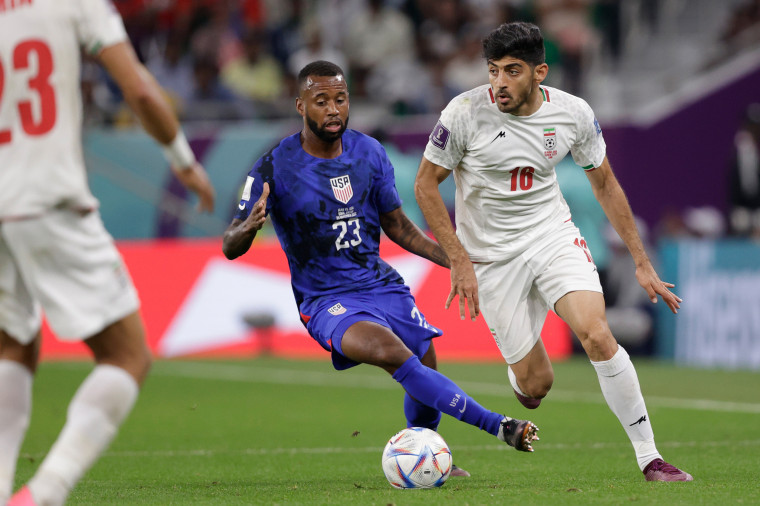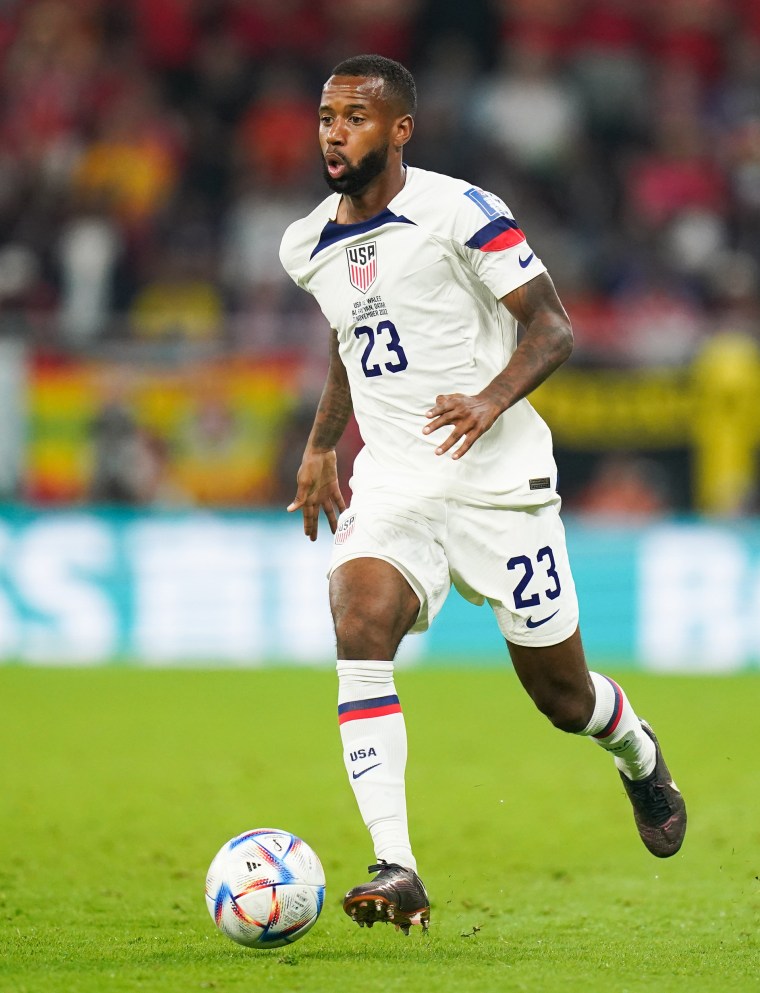[ad_1]
The moment Team USA midfielder Kellyn Acosta’s feet touched the turf at the FIFA World Cup in Qatar, he said he felt awash with gratitude. The professional soccer player, who’s Black and Japanese American, said he knew his participation in the international tournament would mean “something that’s just bigger than me.”
“It is more of an honor. I don’t think ‘burden’ is the right word for it,” Acosta told NBC News from Los Angeles. “I’m representing my country, I’m representing Asian Americans and I’m representing this sport in the U.S. I think it is truly a special thing.”
Acosta, the first Asian American to play in the World Cup for the U.S. Men’s National Team, said for years many had dismissed his Japanese side, not only because of his appearance but also because of harmful stereotypes surrounding Asians and athletics. He himself hasn’t always claimed the Asian identity either, Acosta admitted, adding that his personal journey has been punctuated by moments of inner turmoil. The label “Asian American” has been hard won.
As the World Cup ends on Sunday, the midfielder looks back on the moments of both pain and growth that led him to a place of acceptance he occupies today, hoping to inspire others of Asian descent who have similarly felt the sting of exclusion.

“When you think about sports, and you think about my makeup, you think that’s the African American side of me that makes me excel. But that’s not completely what I am,” Acosta said. “The Asian side of me is also why I excel. It’s based on the discipline and the structure that I have, and that’s allowed me to play at the highest level and break barriers and boundaries.
“Asian Americans as a whole, we can do whatever we want to do. It doesn’t matter our appearance,” he continued. “It’s whatever you put your mind to.”
While the U.S. left the tournament after a loss to the Netherlands in a 3-1 game, Acosta received praise for his performance in the matches leading up to it from the Asian community and beyond, playing an integral role in the team’s advancement to the Round of 16. And he enjoyed the ride with the Asian American community on his mind.
But Acosta, who has a father who immigrated from Japan and a mother who is Black, said that identity has always been a multi-layered discussion for him. With a last name taken from his stepfather, who’s Mexican, and the appearance of a Black man, descriptions of his Japanese background have frequently been met with disbelief. The erasure can be frustrating now, but in his early days, Acosta said he remembered he didn’t want to draw attention to his Asian roots.

Acosta, 27, was raised in Plano, Texas, an area that is currently home to a sizable Asian American population, but was an overwhelmingly white city when he was growing up. In his predominantly white neighborhood, Acosta said he long tried to hide any evidence of his Japanese roots in order to blend in to avoid bullying or any confused stares at his multiethnic family.
“I wanted to fit in so bad there were times my Asian grandma would have to pick me up and park around the corner,” he said. “It was so puzzling for some and I kind of got made fun of for it.”
His feeling like an outsider was only compounded by his love of soccer, an uncommon passion in a town that centered around football culture, he said. And so his early years were shaped by a yearning to fit into a mold that wasn’t natural to him, playing football and finding subtle ways to hide his cultural background.
By high school, the emotional toll became exhausting, Acosta said. His first step to self-acceptance involved an unapologetic dedication to soccer, a radical act, he said, that unraveled a personal reckoning with his identity.
“I kind of just realized that enough is enough. I’m tired of just shying away and hiding behind who I am. I think once I kind of just buckled down and focused on how soccer was the sport that I wanted to play … everything else was like, ‘OK, I’ve knocked down that wall now, what’s next?” he said. “I gotta give credit to the sport because the sport is what allowed me to knock down all these walls that part of me didn’t even realize were up.”
The love of soccer also allowed Acosta to reframe his strict upbringing, seeing the discipline he was taught as a form of care.
“It was all for the greater good. They just wanted what was best for me. And I felt like having that realization and asking the right questions actually brought me closer to them,” he said.
Now as a representative of the U.S., Acosta said he can revere all the cultures in his background. And so, he said with a laugh, it also meant rooting for his family’s home team, Japan.
“We were getting group messages, and I was talking to my grandma as well, as she was super excited about it. Obviously, I had a sense of pride, especially when they beat Germany. I was silently rooting for them,” Acosta said. “They had an exceptional World Cup. Obviously, both of our tournaments ended, but I think we both made our respective countries very proud.”
 Latest Breaking News Online News Portal
Latest Breaking News Online News Portal




